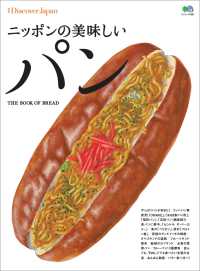- ホーム
- > 洋書
- > 英文書
- > Psychology
Full Description
The first textbook on research methods and methodological questions in the field
This guide provides students and researchers with a clear set of outlines and discussions of particular methods of research in memory studies. It offers not only expert appraisals of a range of techniques, approaches and perspectives, but also focuses on key questions of methodology in order to help bring unity and coherence to this new field of study.
Key Features:
Investigating community remembering and memory in personal narrativesExploring the localisation of official national memory, and the contribution of different memoryscapes and different regimes of memory to cultural heritageAttending to painful pasts and disrupted memory Examining how memory is achieved and communicated in everyday interaction, and how it is manifested in emergent ethnicitiesFocusing on the production of social memory in the media and the use of media as self-produced vehicles of memoryAnalysing the dynamics of remembering in public confessions and apologias, and in testimonies offered by Holocaust survivors
Contents
Introduction: Methodological Premises and Purposes - Michael Pickering and Emily Keightley; Section One: Memory and Identity; 1. Autobiographical Memory - Robyn Fivush; 2. Oral History and Remembering - Joanna Bornat; Section Two: Qualities of Memory; 3. Experience and Memory - Steve Brown and Paula Reavey; 4. Between Official and Vernacular Remembering - Sabina Mihelj; Section Three: Media and Memory; 5. Televised Remembering - Ann Gray; 6. Vernacular Remembering - Michael Pickering and Emily Keightley; Section Four: Locations of Memory; 7. Memoryscapes and Multi-Sited Methods - Paul Basu; 8. Ethnicity and Memory - Amanda Kearney; Section Five: Disturbed Memory; 9. Painful Pasts - Emily Keightley and Michael Pickering; 10. Disrupted Childhoods - Jo Aldridge and Chris Dearden; Section Six: Confessing and Witnessing; 11. Apologia - Cristean Tileaga; 12. Testimony - Jovan Byford; Conclusion - Michael Pickering and Emily Keightley; Further Reading; Bibliography.
-

- 電子書籍
- AR/MS!! (エーアール・マルチプ…
-

- 電子書籍
- 経験の流れとよどみ―ジェイムズ宇宙論へ…
-

- 電子書籍
- 月刊flowers 2022年3月号(…
-

- 電子書籍
- ファラオの娘に転生したら一カ月で夫を選…
-

- 電子書籍
- 別冊Discover Japan ニッ…



